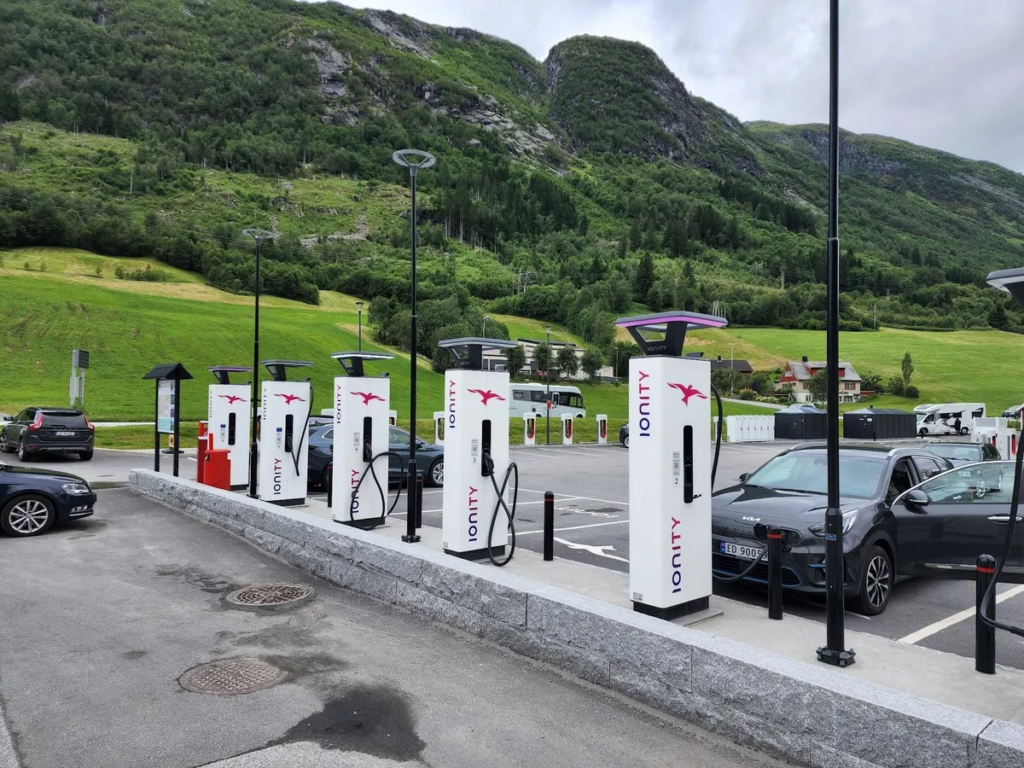As the world moves towards a more sustainable future, electric vehicles (EVs) have become an increasingly popular choice for drivers. However, the success of this transition depends on the development of an infrastructure that can support the widespread adoption of EVs.
Networked EV charging stations are a crucial component of this infrastructure, and they offer a range of benefits that can make the transition to electric vehicles more accessible, convenient, and affordable for drivers. In this blog, we will understand the seven benefits of networked EV charging stations.
What are Networked EV Charging Stations?
Networked EV charging stations are a type of charging infrastructure that allows electric vehicle (EV) owners to recharge their vehicles at public charging stations that are connected to a central network. This network enables charging station operators to remotely monitor and manage the charging stations, track usage, and provide payment processing.
Benefits of Networked EV Charging

1. Improved Accessibility and Convenience
With a network of charging stations, EV owners can find and reserve charging spots through a mobile app or website. This saves time and eliminates the need to drive around looking for a charging station. Networked charging stations can be placed in convenient locations, such as near popular destinations, making them more accessible to EV owners.
By connecting multiple charging stations to a central network, the charging station operator can track usage and demand, and add new charging stations in locations where there is high demand. This helps to reduce congestion at popular charging locations and ensures that EV owners have access to a reliable charging network.
2. Energy-efficient Management

Networked EV charging stations offer an opportunity for improved energy management. Through smart charging technology, charging stations can communicate with one another to distribute the load, ensuring that the energy demands of charging EVs do not exceed the capacity of the electrical grid. This can help prevent blackouts and reduce the need for expensive upgrades to the electrical infrastructure.
- By monitoring charging demand in real-time, grid operators can reduce peak demand by managing charging loads and shifting charging to off-peak hours.
- Networked charging can help grid operators maintain grid stability by balancing charging demand with available grid capacity.
- Networked charging can enable grid operators to integrate renewable energy sources more efficiently, improving grid resiliency and reducing carbon emissions.
3. Cost-effective Pricing

Networked charging can enable cost-effective pricing strategies by providing charging station owners with real-time data on charging demand and usage patterns. This data can be used to implement pricing models that are tailored to the needs of EV drivers, offering more affordable and flexible charging options.
Here are some of the benefits of networked charging for cost-effective pricing:
- By monitoring charging demand and usage patterns, charging station owners can optimize their pricing strategies to maximize revenue while ensuring affordability for EV drivers.
- Offering cost-effective pricing options can help charging station owners attract and retain customers, building a loyal customer base and driving repeat business.
- Networked charging can give charging station owners a competitive advantage by offering more affordable and flexible pricing options compared to other charging networks.
4. User-friendly Features
With mobile apps and online portals, drivers can easily locate charging stations, monitor charging progress, and receive notifications when their vehicle is fully charged. This reduces the frustration of waiting for a charge and provides a more seamless charging experience.
User-friendly features available through networked charging:
- Real-time charging information: Networked charging stations can provide EV drivers with real-time information on charging status, estimated time to full charge, and charging speed, allowing them to plan their charging needs more efficiently.
- Mobile app integration: Many networked charging stations offer mobile app integration, allowing EV drivers to find charging stations, reserve a charging spot, and pay for charging sessions from their smartphone such as Statiq EV charging app.
- 24/7 customer support: Networked charging providers often offer 24/7 customer support, providing EV drivers with assistance in case of technical issues, billing questions, or other concerns.
- Remote monitoring and management: Networked charging stations can be remotely monitored and managed, allowing charging station owners to monitor station usage, manage pricing strategies, and perform diagnostics and maintenance tasks from a central location. The Charging Station Management System (CSMS) is a one-stop software solution that allows you to manage your chargers remotely from anywhere, anytime.
- Automatic billing and payment processing: Networked charging stations can automatically process payments, reducing administrative tasks and improving the efficiency of charging station operations.
- Data analytics and reporting: Networked charging stations can provide charging station owners with data analytics and reporting tools, allowing them to gain insights into usage patterns, revenue, and other key performance indicators and make informed decisions about their charging network.
5. Reduced Reliance on Fossil Fuels
Another significant benefit of networked EV charging stations is their ability to reduce reliance on fossil fuels. By providing a network of charging stations, more people are encouraged to purchase electric vehicles, which ultimately leads to a reduction in greenhouse gas emissions and other harmful pollutants.
6. Increased Revenue Opportunities

Networked EV charging stations can also provide increased revenue opportunities for businesses and municipalities. By offering charging services, businesses can attract more customers, particularly EV drivers who may choose to frequent their establishment based on the availability of charging. Municipalities can also generate revenue through the sale of electricity or by charging for parking at charging stations.
7. Positive Environmental Impact
Finally, networked EV charging stations have a positive environmental impact. By reducing reliance on fossil fuels and increasing the number of electric vehicles on the road, networked charging stations help reduce greenhouse gas emissions and other harmful pollutants, improving air quality and public health.
Future Of Networked Charging

The future of networked charging is bright, with many advancements and trends pointing towards a more efficient, reliable, and sustainable charging infrastructure. Here are some of the key advancements and trends in networked charging, as well as their potential benefits and implications:
- Increased charging speeds: As battery technology improves, charging speeds are expected to increase, with some charging stations already offering ultra-fast charging capabilities. This will reduce charging times and improve the convenience of electric vehicles, making them more attractive to a wider range of consumers.
- Integration with renewable energy sources: Networked charging stations are increasingly being integrated with renewable energy sources such as solar and wind, enabling charging infrastructure to be powered by clean, sustainable energy. This will reduce carbon emissions and improve the sustainability of the transportation sector.
- Vehicle-to-grid (V2G) technology: V2G technology allows electric vehicles to send energy back to the grid, enabling them to function as mobile energy storage units. This will help to balance the grid and support the integration of renewable energy sources, reducing the need for traditional fossil fuel power plants.
- Artificial intelligence (AI) and machine learning: AI and machine learning are being applied to networked charging to optimize charging infrastructure, predict charging demand, and improve the efficiency of charging operations. This will improve the reliability and responsiveness of charging infrastructure, reducing downtime and improving the customer experience.
- Wireless charging: Wireless charging technology is currently in development, which will allow electric vehicles to charge without the need for physical cables or plugs. This will make charging even more convenient and reduce the need for bulky charging infrastructure.
Conclusion
In conclusion, networked EV charging stations offer numerous benefits that can make the transition to electric vehicles more accessible, convenient, and affordable for drivers. From increased accessibility and convenience to enhanced energy management and grid resilience, networked charging stations are an essential component of the transition to a cleaner, more sustainable future.
FAQs
What is a networked EV charging station?
Ans. A networked EV charging station is a charging station that is connected to a network, allowing for remote monitoring, control, and data analysis.
How do networked charging stations increase accessibility?
Ans. Networked charging stations increase accessibility by enabling real-time monitoring, reservation, and payment options, which enhances user convenience.
What is efficient energy management in the context of networked charging?
Ans. Efficient energy management in networked charging involves balancing charging demand with available energy supply, optimizing energy usage, and reducing peak demand.
How can networked charging enable cost-effective pricing strategies?
Ans. Networked charging enables cost-effective pricing strategies through dynamic pricing and demand response programs.
What user-friendly features are available through networked charging?
Ans. User-friendly features available through networked charging include mobile apps, reservation systems, and real-time status updates.
How does networked charging enable enhanced data analytics?
Ans. Networked charging enables enhanced data analytics, including energy usage patterns, vehicle charging behaviors, and station performance, which informs energy management decisions.
What are the benefits of networked charging for EV drivers?
Ans. The benefits of networked charging for EV drivers include convenient access, reliable charging, and cost savings.
What are the benefits of networked charging for charging station owners?
Ans. The benefits of networked charging for charging station owners include increased revenue, improved station utilization, and enhanced customer satisfaction.
What are the benefits of networked charging for utility companies and grid operators?
Ans. The benefits of networked charging for utility companies and grid operators include improved grid stability, increased renewable energy integration, and reduced peak demand.
What advancements and trends are shaping the future of networked charging?
Ans. Advancements and trends shaping the future of networked charging include higher power charging, bidirectional charging, and integration with renewable energy sources.

Good post. I will be dealing with some of these issues as well..